- Home
- John le Carré
Agent Running in the Field Page 7
Agent Running in the Field Read online
Page 7
At the age of eighteen, he renounced his Christian faith in favour of what he called ‘all-inclusive humanism’ which I took to be Nonconformism without God, but out of tact I refrained from suggesting this to him.
From grammar school he went to a ‘new’ university, I am not sure which. Computer Sciences, German an optional extra. Class of degree not specified, so I suspect middling, new being his own disparaging term.
As regards girls – always a delicate area where Ed was concerned, and not one I would have entered uninvited – either they didn’t like him, or he didn’t like them. I suspect that his urgent preoccupation with world affairs and other mild eccentricities made a demanding life-companion of him. I also suspect he didn’t know his own attraction.
And of men friends, the people he should be hanging out with in the gym, or sorting the world with, or jogging, cycling, pubbing? Ed never mentioned a single such person to me, and I question whether they existed in his life. Deep down, I suspect, he wore his isolation as a badge of honour.
He had heard about me on the badminton grapevine and had secured me for his regular opponent. I was his prize. He had no wish to share me.
When I had reason to ask him what had prompted him to take a job in the media if he loathed it so much, he was at first evasive:
Saw an ad somewhere, interviewed for it. They set a sort of exam paper, said all right, come on in. That’s about it. Yeah – Ed.
But when I asked him whether he had congenial colleagues in his workplace he merely shook his head as if the question were irrelevant.
And the good news in Ed’s otherwise solitary universe as far as I could read it? Germany. And again Germany.
Ed had the German bug in a big way. I suppose I have it myself, if only from the reluctant German lurking in my mother. He’d spent a study year in Tübingen and two years in Berlin working for his media outfit. Germany was the cat’s whiskers. Its citizens were simply the best Europeans ever. No other nation holds a candle to Germans, not when it comes to understanding what European union is all about – Ed on his high horse. He’d considered chucking everything and making a new life there, but it hadn’t worked out with the girl, a research student at Berlin University. It was thanks to her, so far as I could gather, that he had made some sort of study of the rise of German nationalism in the nineteen twenties, which seems to have been her subject. What is certain is that on the strength of such arbitrary studies he felt empowered to draw disturbing parallels between the rise of Europe’s dictators and the rise of Donald Trump. Get him on this subject, and you got Ed at his most overbearing.
In Ed’s world there was no dividing line between Brexit fanatics and Trump fanatics. Both were racist and xenophobic. Both worshipped at the same shrine of nostalgic imperialism. Once embarked on this theme, he lost all objectivity. The Trumpists and the Brexiteers were conspiring to deprive him of his European birthright. Solitary as he might be in other ways, on Europe he showed no compunction in declaring that he spoke for his generation or in pointing the finger at mine.
There was an occasion when we were seated, temporarily exhausted, in the Athleticus changing room after our usual hard-fought game. Diving into his locker to retrieve his smartphone, he insisted on showing me video footage of Trump’s inner cabinet gathered round a table as each in turn protests his undying loyalty to his dear leader.
‘They’re taking the bloody Führer’s oath,’ he confides to me in a breathless voice. ‘It’s a replay, Nat. Watch.’
I dutifully watched. And yes, it was emetic.
I never asked him, but I think it was Germany’s atonement for its past sins that spoke most forcefully to his secularized Methodist soul: the thought that a great nation that had run amok should repent its crimes to the world. What other country had ever done such a thing? he demanded to know. Had Turkey apologized for slaughtering the Armenians and Kurds? Had America apologized to the Vietnamese people? Had the Brits atoned for colonizing three-quarters of the globe and enslaving numberless of its citizens?
The up-and-down handshake? He never told me, but my guess was he’d picked it up while he was lodged in Berlin with the girl’s Prussian family, and out of some weird sense of loyalty had stuck to the habit.
7
It’s ten o’clock on a sun-drenched Friday morning in spring and the birds all know it, as Florence and I, having met for an early coffee, I from Battersea and she, I assume, from Pimlico, step out along the Thames Embankment towards Head Office. In the past, returning from distant outstations for Office parleys or home leave, I have occasionally felt daunted by our over-conspicuous, many-towered Camelot with its whispering lifts, hospital-bright corridors and tourists gawping from the bridge.
Not today.
In half an hour’s time Florence will be presenting London General’s first full-blown special operation in three years and it will bear the Haven’s imprimatur. She sports a smart trouser suit and just a hint of make-up. If she has stage fright she betrays no sign of it. For the last three weeks we have been night owls together, sitting head to head into the small hours at the rickety trestle table in the Haven’s windowless Operations room, poring over street maps, surveillance reports, phone and email intercepts, and the latest word from Orson’s disenchanted mistress, Astra.
It was Astra who first reported that Orson was about to use his Park Lane duplex to impress a duo of Cyprus-based, Moscow-friendly money-launderers of Slovakian descent with a private bank in Nicosia and an affiliate in the City of London. Both are fully identified members of a Kremlin-approved crime syndicate operating out of Odessa. On receiving word of their arrival, Orson ordered an electronic sweep of his duplex. No devices were discovered. It was now up to Percy Price’s intrusion team to remedy that omission.
With the consent of its absent director, Bryn Jordan, Russia department has also taken a couple of its own steps into the water. One of its officers has posed as Florence’s Daily Mail news editor and clinched the deal with the night porter. The gas company supplying energy to Orson’s duplex has been prevailed on to report a leak. A three-man team of burglars under the pompous Eric has reconnoitred the duplex in the guise of the company’s engineers and photographed the locks on the reinforced steel door leading to the computer room. The British lockmakers have provided duplicate keys and guidance on the unscrambling of the combination.
Now all that remains is for Rosebud to be officially green-lit by a plenum of Head Office’s big beasts, known collectively as Operations Directorate.
*
If the relationship between Florence and myself is emphatically non-tactile, with each of us going to elaborate lengths not to brush hands or otherwise make physical contact, it is nonetheless close. It turns out that our lives overlap in more ways than we might have expected, given the difference in our ages. Her father the ex-diplomat had done two successive stints at the British Embassy in Moscow, taking with him his wife and three children of whom Florence was the eldest. Prue and I had missed them by six months.
While attending International School in Moscow she had embraced the Russian muse with all the zeal of youth. She even had a Madame Galina in her life: the widow of an ‘approved’ poet from Soviet times with a tumbledown dacha in the old artists’ colony of Peredelkino. By the time Florence was ready to attend English boarding school the Service’s talent spotters were keeping an eye on her. When she sat her A-level exams, they dispatched their own Russian linguist to assess her language skills. She was awarded the highest grade available to non-Russians, and approached when she was just nineteen.
At university she continued her studies under the Office’s supervision and spent part of each vacation on low-grade training runs: Belgrade, Petersburg and most recently Tallinn, where once again we might have met had she not been living her cover as a forestry student and I as a diplomat. She loved to run, as I do: I in Battersea Park, she to my surprise on Hampstead Heath. When I pointed out to her that Hampstead was a long way from Pimlico, she replied without
hesitation that there was a bus that took her from door to door. In an idle moment I checked, and it was true: the 24 went all the way.
What more did I know of her? That she had a consuming sense of natural justice that put me in mind of Prue. That she loved the spice of operational work, and had a talent for it that went beyond the normal. That the Office frequently exasperated her. That she was reticent, even guarded, about her private life. And there was an evening, after a long day’s work, when I caught sight of her crouched in her cubicle with fists clenched and tears running down her cheeks. One thing I have learned the hard way from Steff: never ask what’s wrong, just give her space. I gave her space, didn’t ask, and the cause of her tears remained her own.
But today she hasn’t a care in the world beyond Operation Rosebud.
*
There is a dreamlike quality to my recollection of that morning’s gathering of the Office’s finest, a sense of what might have been and a remembrance of last things: the top-floor conference room with its sunlit skylights and honey-coloured panelling, the intelligent, listening faces turned to Florence and myself seated shoulder to shoulder at the suitors’ end of the table. Every member of our audience was known to me from past lives, and each in his or her different way deserving of my respect: Ghita Marsden, my former head of Station in Trieste and the first woman of colour to make it to the top floor; Percy Price, head of the Service’s ever-expanding surveillance arm. The list goes on. Guy Brammel, the portly, wily, fifty-five-year-old head of Russian Requirements presently standing in for Bryn Jordan stranded in Washington. Marion, a senior-ranking member of our sister Service, on attachment. Then two of Guy Brammel’s most valued female colleagues, Beth (North Caucasus) and Lizzie (Russian Ukraine). And last and emphatically least, Dom Trench, as head of London General, who makes a point of not entering until everyone else is settled, for fear of being shown to a lesser seat.
‘Florence,’ says Guy Brammel indulgently down the table. ‘Let’s have your pitch, shall we?’
And suddenly there she is, no longer at my side but standing six feet from me in her trouser suit: Florence, my talented if temperamental second-year probationer, speaking wisdom to her elders while our own little Ilya from the Haven squats elf-like in the projection booth with a cue sheet, accompanying her with his slideshow.
There’s no passionate throb to Florence’s voice today, no hint of the inner fires that have been raging in her over the last months, or the special place reserved for Orson in her private inferno. I have warned her to keep her emotions down and language clean. Percy Price, our head watcher, is a keen churchman and no friend of Anglo-Saxon expletives. Neither I suspect is Ghita, tolerant though she is of our infidel ways.
And thus far Florence has stayed on message. In reading out Orson’s charge sheet she is neither indignant nor declamatory – she can be both at the drop of a hat – but as self-composed as Prue on the occasions when I pop into court for ten minutes just for the pleasure of hearing her tear the opposition into courteous shreds.
First she gives us Orson’s unexplained wealth – massive, offshore, administered from Guernsey and the City of London, where else? – then Orson’s other overseas properties, in Madeira, Miami, Zermatt and on the Black Sea, then his unexplained presence at a reception held at the Russian Embassy in London for leading Brexiteers, and his million-pound contribution to an arm’s-length fighting fund for Leavers. She describes a covert meeting that Orson attended in Brussels with six Russian cyber experts suspected of wide-scale hacking into Western democratic forums. All this and more without a tremor of emotion.
Only when she comes to the proposed positioning of hidden microphones in the target duplex does her cool desert her. Ilya’s slideshow is giving us a dozen of them, each marked with its own red spot. Marion begs to interrupt:
‘Florence,’ she says severely, ‘I fail to understand why you are proposing to deploy special facilities against under-age children.’
I don’t think I’d seen Florence struck mute till now. As her substation head I hasten to her assistance.
‘I think Marion must be referring to our recommendation that all rooms in Orson’s duplex should be covered regardless of who occupies them,’ I murmur to her in a stage aside.
But Marion is not to be mollified.
‘I am questioning the ethics of installing audio and visual facilities in a child’s nursery. Also in the nanny’s bedroom, which I find equally questionable, if not more so. Or are we to suppose that Orson’s children and the nanny are of intelligence interest?’
Florence has by now collected herself. Or, if you know her as I do, readied herself for combat. She takes a breath and puts on her sweetest Cheltenham Ladies’ College voice.
‘The nursery, Marion, is where Orson takes his business friends when he’s got something especially secret to tell them. The nanny’s room is where he screws his hookers when the kids are in Sochi having a seaside holiday with Nanny and his wife’s out buying jewellery at Cartier’s. Source Astra tells us that Orson likes to boast to his women about his clever deals while he screws them. We thought we should hear him do that.’
But it’s all right. Everyone’s laughing, Guy Brammel loudest; even Marion is laughing. Dom is laughing, which is to say he’s shaking and smiling, even if no laughter is coming out. We stand, little groups form at the coffee table. Ghita is offering Florence sisterly congratulations. An unseen hand closes on my upper arm, a thing I don’t take kindly to at the best of times.
‘Nat. Such a good meeting. A credit to London General, a credit to the Haven, a credit to you personally.’
‘Glad you enjoyed it, Dom. Florence is a promising officer. Nice to have her authorship recognized. So easy for these things to slip by.’
‘And always that moderating voice of yours in the background,’ Dom returns, affecting not to hear my little sally. ‘I could practically hear it: that fatherly touch of yours.’
‘Well, thank you, Dom. Thank you,’ I reply handsomely, and wonder what he’s got up his sleeve.
*
In the afterglow of a job well done, Florence and I amble back along the river footpath in the sunshine, remarking to each other – but mostly Florence doing the remarking – that if Rosebud yields only a quarter of the dividend we’re predicting, one thing we can be reasonably sure of is it will be curtains for Orson’s role as Russia’s stooge in London and curtains – her most devout wish – for his stockpiles of filthy money stashed around the southern hemisphere by the City of London’s ever-rotating laundromat.
Then, because we haven’t eaten and time is anyway a little unreal after all the night hours we have invested in this moment, we put off taking the tube, dive into a pub, find an alcove to ourselves and over fish pies and a bottle of red burgundy – also Steff’s tipple, as I can’t resist telling her, and both of them fish fanatics – we review in suitably oblique language the morning’s proceedings, which were actually a lot longer and more technical than I’ve given here, with contributions from Percy Price and Eric the pompous burglar about such matters as the marking and monitoring of surveillance targets, impregnating the target’s shoes or clothing, the use of a helicopter or drone, and what will happen in the event of an unscheduled return by Orson and his entourage to the target duplex while the stealth team is still inside. Answer, they will be politely informed by a uniformed police officer that intruders have been reported in the building, so will the good ladies and gentlemen kindly avail themselves of the police van and enjoy a nice cup of hot tea while investigations proceed?
‘So that’s really it, is it?’ Florence muses over her second or maybe third glass of red. ‘We’re home and dry. Citizen Kane, your day has finally come.’
‘Not till the fat lady sings,’ I warn her.
‘Who the fuck’s she?’
‘A Treasury sub-committee has to give its blessing.’
‘Consisting of?’
‘One mandarin apiece from Treasury, Foreign Office, Home Offic
e and Defence. Plus a couple of co-opted parliamentarians who can be trusted to do what they’re told.’
‘Which is what?’
‘Rubber-stamp the op and pass it back to Head Office for action.’
‘Bloody waste of time, if you ask me.’
We return by tube to the Haven to discover that Ilya has raced ahead of us to report a great victory with Florence as heroine of the hour. Even grumpy Igor, the sixty-five-year-old Lithuanian, emerges from his den to shake her hand and – though he secretly suspects that any replacement of Giles must be a Russian plot – mine also. I escape to my office, sling my tie and jacket over a chair and am in the act of closing down my computer when the family mobile phone croaks at me. Assuming it’s Prue and hoping it’s Steff at long last, I delve in my jacket pocket. It’s Ed, sounding dire.
‘That you, Nat?’
‘Amazingly, it is. And you must be Ed,’ I reply frivolously.
‘Yeah, well.’ Long pause. ‘Only it’s about Laura, you see. On Monday.’
Laura, the sister who has learning difficulties.
‘That’s all right, Ed. If you’re tied up with Laura, forget it. We’ll play another time. Just say the word and I’ll see when I’m free.’
This is not the reason he called, however. There’s something else going on. With Ed there always is. Wait long enough, he’ll tell you.
‘Only she wants a four, you see.’
‘Laura does?’
‘At badminton. Yeah.’
‘Ah. At badminton.’
‘She’s a demon for it when she’s in the mood. No good, mind. I mean, sort of really no good. But, you know. Enthusiastic.’
‘Of course. That sounds fine. So what kind of four?’
‘Well, mixed, you know. With a woman. Maybe your wife.’ He knows Prue’s name but seems unable to speak it. I say Prue for him and he says, ‘Yeah, Prue.’
‘Prue can’t, Ed, I’m afraid. I don’t even have to ask her. Mondays are surgery night for hard-luck clients, remember? Haven’t you got somebody in your shop?’

 The Honorable Schoolboy
The Honorable Schoolboy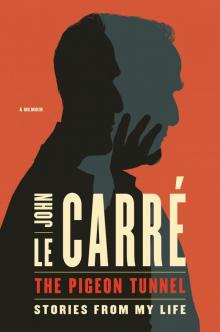 The Pigeon Tunnel: Stories From My Life
The Pigeon Tunnel: Stories From My Life Single & Single
Single & Single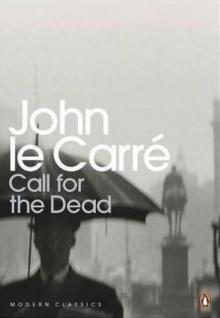 The Spy Who Came in From the Cold
The Spy Who Came in From the Cold The Looking Glass War
The Looking Glass War The Night Manager
The Night Manager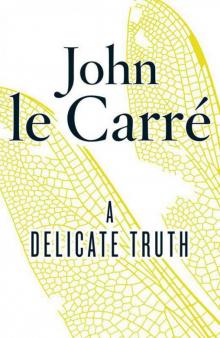 A Delicate Truth
A Delicate Truth A Perfect Spy
A Perfect Spy The Little Drummer Girl
The Little Drummer Girl Absolute Friends
Absolute Friends A Murder of Quality AND Call for the Dead
A Murder of Quality AND Call for the Dead The Russia House
The Russia House The Tailor of Panama
The Tailor of Panama Tinker, Tailor, Soldier, Spy
Tinker, Tailor, Soldier, Spy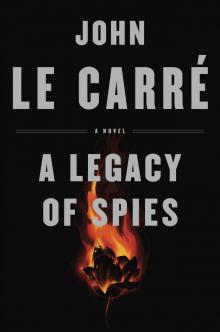 A Legacy of Spies
A Legacy of Spies The Mission Song
The Mission Song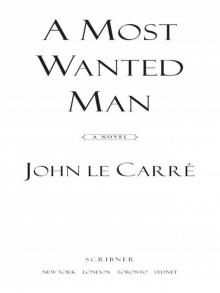 A Most Wanted Man
A Most Wanted Man John Le Carré: Three Complete Novels
John Le Carré: Three Complete Novels The Secret Pilgrim
The Secret Pilgrim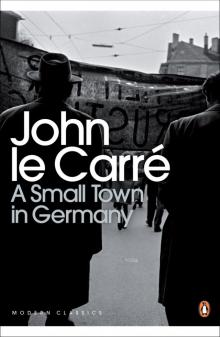 A Small Town in Germany
A Small Town in Germany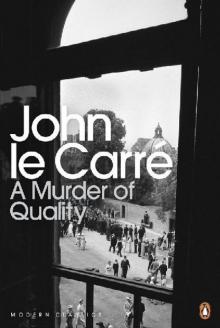 A Murder of Quality
A Murder of Quality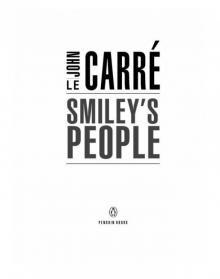 Smiley's People
Smiley's People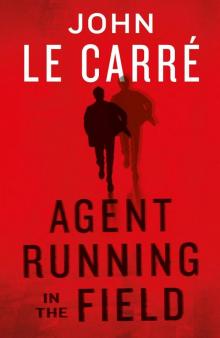 Agent Running in the Field
Agent Running in the Field The Spy Who Came in from the Cold s-3
The Spy Who Came in from the Cold s-3 The Pigeon Tunnel
The Pigeon Tunnel The Russia House - 13
The Russia House - 13 The Honourable Schoolboy
The Honourable Schoolboy Call For The Dead s-1
Call For The Dead s-1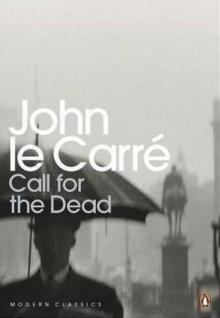 Call for the Dead
Call for the Dead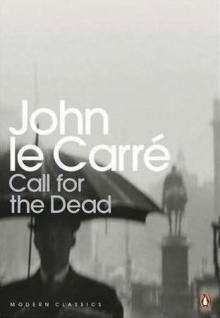 Call for the Dead - 1
Call for the Dead - 1